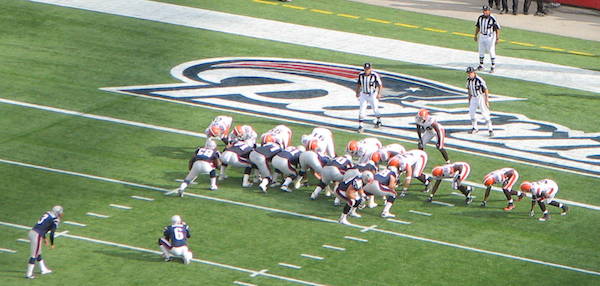Something interesting happened at the end of the National Football League (NFL) game last Thursday between the New England Patriots and the New York Jets. A small interaction between a ref and a player played a potentially big role in the outcome of the game. Of interest to us is not the outcome of the game but what it says about the function of officials in football and how well that maps to our perception of authorities in the rest of society. Let’s start unpacking this thing from the trunk.
At the end of the game, the Patriots were up by two points. The Jets last chance to win the game was to kick a very long field goal to get three points. They lined up for a 58 yard field goal. This is not an impossible task but it’s very difficult. As the teams set up for the attempt, a Patriot defender was lined up directly opposite from the Jets center. On field goal attempts, the center is a specialist called a long snapper who’s entire job is to snap the ball back to kickers on field goal and punting plays. The New York Times ran an incredible video feature on how field goal attempts work back in 2013. Check it out here if you want to know how they work. Anyhow, the thing that’s important to us is that when the long snapper is doing his thing, he’s basically an open target to defenders who could really smush him into the ground. So, the NFL created a rule to protect the long snapper by mandating that defensive players may not line up directly opposite from him. The exact text of the rule from the NFL playbook is this: “When Team A presents a punt, field-goal, or Try Kick formation, a Team B player, who is within one yard of the line of scrimmage, must have his entire body outside the snapper’s shoulder pads at the snap.”
The Patriots player was set up in an illegal position and, if the ball had been snapped while he was in that position, his team would have been assessed a five yard penalty. The Jets could then have tried a 53 yard field goal to win the game instead of a 58 yard one. How big of a difference is this? Pretty big. Jets kicker Nick Folk has made a little more than half his field goal attempts over 50 yards but never one over 56 yards. So, that penalty could really have helped the Jets. Unfortunately for them, a ref did something which is apparently very common and noncontroversial: he stepped forward, and nudged the player in the illegal position to warn him to move over so that he didn’t get a penalty. The defender moved, the long snapper snapped the ball, the kicker aimed low so that his kick had a chance to fly 58 yards, and a defender reached up with his hand and blocked the kick. No penalty was called. Game over, the Patriots win.
What’s so interesting about this is that we normally think of refs as being there to penalize wrongdoing not to prevent rule breaking or to protect the safety of the players. In the aftermath of the game, after initial claims of controversy and cheating, we learned that refs do this type of preventative action all the time. The most interesting part of the story became how non-controversial it was. Even the Jets coach admitted the ref was “not wrong doing what he did.” League spokesman Greg Aiello was interviewed by Dom Cosentino in his article about the incident for NJ.com. Read closely because Aiello offers two explanations:
It is a standard officiating procedure that occurs regularly… That rule was adopted for player safety purposes, another good reason to help avoid violations in advance.”
“Helping players get lined up properly takes place in other pre-snap situations to avoid administrative penalties… It’s a longstanding standard officiating mechanic.”
Preventing penalties serves the twin purposes of player safety and maximum entertainment even if it comes at the cost of some marginal amount of competitive balance. Teams that are slightly sloppier in their mechanics probably receive more help from refs than more precise teams. It’s hard to shake the feeling that the Jets got a raw deal. Losing a game in part because a ref helped an opponent avoid a penalty doesn’t feel fair, even if the overall approach seems reasonable.
Does this same principle hold for authorities outside of sports? Take the approach of police to the dangerous practice of speeding. Police give out penalties for drivers they catch speeding, just like refs do for players caught breaking the rules. Police also do things to prevent speeding without giving tickets. If you’ve ever seen an empty police car at the side of the road or one of those digital readouts that show your current speed next to the speed limit, they are tactics the police use to slow people down without giving tickets. In this context, authority measures used to prevent violations before they occur don’t seem so bad, do they?

